新新目标八年级英语(下)
- 格式:doc
- 大小:111.00 KB
- 文档页数:21
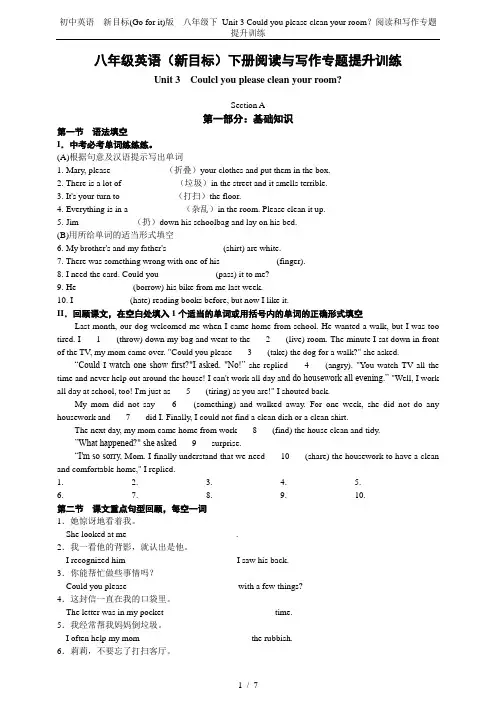
八年级英语(新目标)下册阅读与写作专题提升训练Unit 3 Coulcl you please clean your room?Section A第一部分:基础知识第一节语法填空I.中考必考单词练练练。
(A)根据句意及汉语提示写出单词1. Mary, please ____________(折叠)your clothes and put them in the box.2. There is a lot of ____________(垃圾)in the street and it smells terrible.3. It's your turn to ____________(打扫)the floor.4. Everything is in a ____________(杂乱)in the room. Please clean it up.5. Jim ____________(扔)down his schoolbag and lay on his bed.(B)用所给单词的适当形式填空6. My brother's and my father's ____________ (shirt) are white.7. There was something wrong with one of his ____________ (finger).8. I need the card. Could you ____________ (pass) it to me?9. He ____________ (borrow) his bike from me last week.10. I ____________ (hate) reading books before, but now I like it.II.回顾课文,在空白处填入1个适当的单词或用括号内的单词的正确形式填空Last month, our dog welcomed me when I came home from school. He wanted a walk, but I was too tired. I ___1___ (throw) down my bag and went to the ___2___ (live) room. The minute I sat down in front of the TV, my mom came over. "Could you please ___3___ (take) the dog for a walk?" she asked.“Could I watch one show first?"I asked. "No!”she replied ___4___ (angry). "You watch TV all the time and never help out around the house! I can't work all day a nd do housework all evening.” "Well, I work all day at school, too! I'm just as ___5___ (tiring) as you are!" I shouted back.My mom did not say ___6___ (something) and walked away. For one week, she did not do any housework and ___7___ did I. Finally, I could not find a clean dish or a clean shirt.The next day, my mom came home from work ___8___ (find) the house clean and tidy.”What happened?" she asked ___9___ surprise.“I'm so sorry, Mom. I finally understand that we need ___10___ (share) the housework to have a clean and comfortable home," I replied.1. ____________2. ____________3. ____________4. ____________5. ____________6. ____________7. ____________8. ____________9. ____________ 10. ____________第二节课文重点句型回顾,每空一词1.她惊讶地看着我。
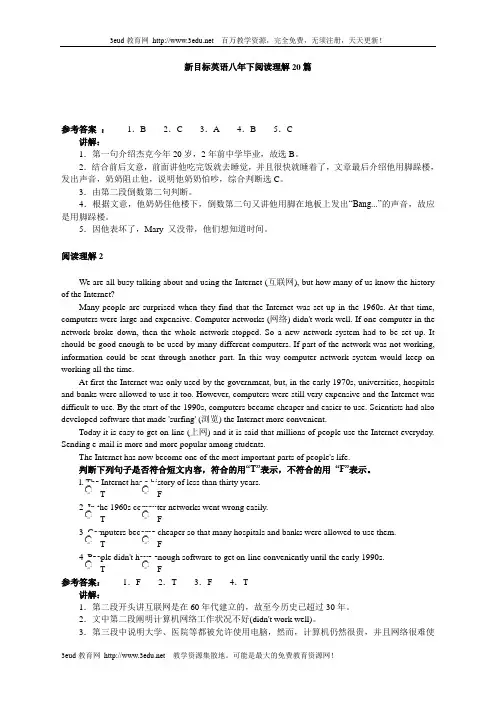
新目标英语八年下阅读理解20篇参考答案:1.B2.C3.A4.B5.C讲解:1.第一句介绍杰克今年20岁,2年前中学毕业,故选B。
2.结合前后文意,前面讲他吃完饭就去睡觉,并且很快就睡着了,文章最后介绍他用脚跺楼,发出声音,奶奶阻止他,说明他奶奶怕吵,综合判断选C。
3.由第二段倒数第二句判断。
4.根据文意,他奶奶住他楼下,倒数第二句又讲他用脚在地板上发出“Bang...”的声音,故应是用脚跺楼。
5.因他表坏了,Mary 又没带,他们想知道时间。
阅读理解2We are all busy talking about and using the Internet (互联网), but how many of us know the history of the Internet?Many people are surprised when they find that the Internet was set up in the 1960s. At that time, computers were large and expensive. Computer networks (网络) didn't work well. If one computer in the network broke down, then the whole network stopped. So a new network system had to be set up. It should be good enough to be used by many different computers. If part of the network was not working, information could be sent through another part. In this way computer network system would keep on working all the time.At first the Internet was only used by the government, but, in the early 1970s, universities, hospitals and banks were allowed to use it too. However, computers were still very expensive and the Internet was difficult to use. By the start of the 1990s, computers became cheaper and easier to use. Scientists had also developed software that made 'surfing' (浏览) the Internet more convenient.Today it is easy to get on-line (上网) and it is said that millions of people use the Internet everyday. Sending e-mail is more and more popular among students.The Internet has now become one of the most important parts of people's life.判断下列句子是否符合短文内容,符合的用“T”表示,不符合的用“F”表示。
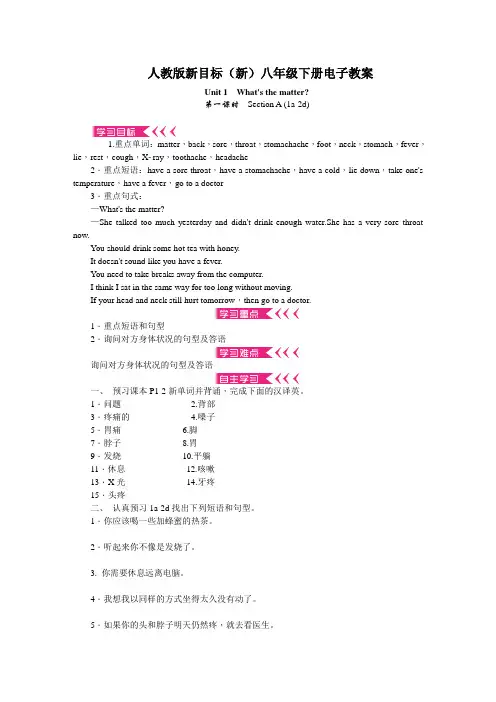
人教版新目标(新)八年级下册电子教案Unit 1What's the matter?第一课时Section A (1a-2d)1.重点单词:matter,back,sore,throat,stomachache,foot,neck,stomach,fever,lie,rest,cough,Xray,toothache,headache2.重点短语:have a sore throat,have a stomachache,have a cold,lie down,take one's temperature,have a fever,go to a doctor3.重点句式:—What's the matter?—She talked too much yesterday and didn't drink enough water.She has a very sore throat now.You should drink some hot tea with honey.It doesn't sound like you have a fever.You need to take breaks away from the computer.I think I sat in the same way for too long without moving.If your head and neck still hurt tomorrow,then go to a doctor.1.重点短语和句型2.询问对方身体状况的句型及答语询问对方身体状况的句型及答语一、预习课本P1-2新单词并背诵,完成下面的汉译英。
1.问题____________ 2.背部____________3.疼痛的____________ 4.嗓子____________5.胃痛____________ 6.脚____________7.脖子____________ 8.胃____________9.发烧____________ 10.平躺____________11.休息____________ 12.咳嗽____________13.X光____________ 14.牙疼____________15.头疼____________二、认真预习1a-2d找出下列短语和句型。
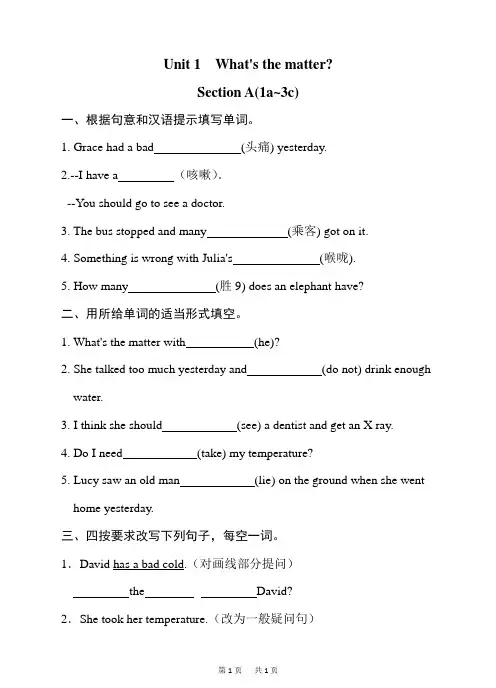
Unit 1 What's the matter?Section A(1a~3c)一、根据句意和汉语提示填写单词。
1. Grace had a bad (头痛) yesterday.2.--I have a (咳嗽).--You should go to see a doctor.3. The bus stopped and many (乘客) got on it.4. Something is wrong with Julia's (喉咙).5. How many (胜9) does an elephant have?二、用所给单词的适当形式填空。
1. What's the matter with (he)?2. She talked too much yesterday and (do not) drink enough water.3. I think she should (see) a dentist and get an X ray.4. Do I need (take) my temperature?5. Lucy saw an old man (lie) on the ground when she went home yesterday.三、四按要求改写下列句子,每空一词。
1.David has a bad cold.(对画线部分提问)the David?2.She took her temperature.(改为一般疑问句)she her temperature?3.You should put some medicine on it.(对画线部分提问)I ?4.He may be a doctor.(改为同义句)he is a doctor.5.Peter has a bad toothache.(改为一般疑问句,并作否定同答)Peter a bad toothache?No,he .四、四单项选择。
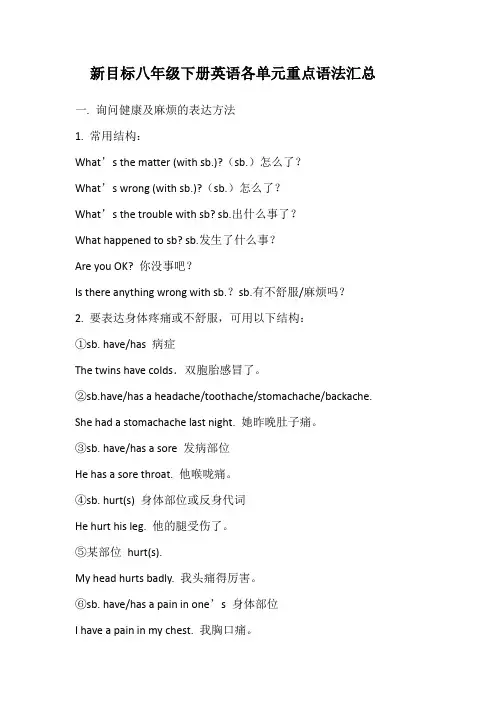
新目标八年级下册英语各单元重点语法汇总一. 询问健康及麻烦的表达方法1. 常用结构:What’s the matter (with sb.)?(sb.)怎么了?What’s wrong (with sb.)?(sb.)怎么了?What’s the trouble with sb? sb.出什么事了?What happened to sb? sb.发生了什么事?Are you OK? 你没事吧?Is there anything wrong with sb.?sb.有不舒服/麻烦吗?2. 要表达身体疼痛或不舒服,可用以下结构:①sb. have/has 病症The twins have colds.双胞胎感冒了。
②sb.have/has a headache/toothache/stomachache/backache. She had a stomachache last night. 她昨晚肚子痛。
③sb. have/has a sore 发病部位He has a sore throat. 他喉咙痛。
④sb. hurt(s) 身体部位或反身代词He hurt his leg. 他的腿受伤了。
⑤某部位hurt(s).My head hurts badly. 我头痛得厉害。
⑥sb. have/has a pain in one’s 身体部位I have a pain in my chest. 我胸口痛。
⑦(There is) something wrong with one’s 身体部位There is something wrong with my right eye. 我的右眼有毛病。
⑧其他表达方式She has a heart trouble. 她有心脏病。
He got hit on the head. 他头部受到了撞击。
She cut her finger. 她割破手指了。
二.情态动词should1. should为情态动词,意为“应该;应当”,否定式为shouldn’t,其后接动词原形,无人称和数的变化。
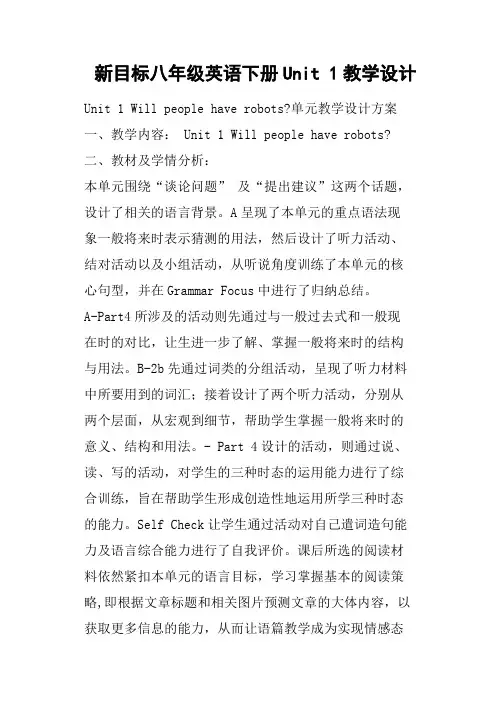
新目标八年级英语下册Unit 1教学设计Unit 1 Will people have robots?单元教学设计方案一、教学内容: Unit 1 Will people have robots?二、教材及学情分析:本单元围绕“谈论问题” 及“提出建议”这两个话题,设计了相关的语言背景。
A呈现了本单元的重点语法现象一般将来时表示猜测的用法,然后设计了听力活动、结对活动以及小组活动,从听说角度训练了本单元的核心句型,并在Grammar Focus中进行了归纳总结。
A-Part4所涉及的活动则先通过与一般过去式和一般现在时的对比,让生进一步了解、掌握一般将来时的结构与用法。
B-2b先通过词类的分组活动,呈现了听力材料中所要用到的词汇;接着设计了两个听力活动,分别从两个层面,从宏观到细节,帮助学生掌握一般将来时的意义、结构和用法。
- Part 4设计的活动,则通过说、读、写的活动,对学生的三种时态的运用能力进行了综合训练,旨在帮助学生形成创造性地运用所学三种时态的能力。
Self Check让学生通过活动对自己遣词造句能力及语言综合能力进行了自我评价。
课后所选的阅读材料依然紧扣本单元的语言目标,学习掌握基本的阅读策略,即根据文章标题和相关图片预测文章的大体内容,以获取更多信息的能力,从而让语篇教学成为实现情感态度与价值观目标的有效载体,通过描述未来,调动学生学习积极性,发挥想象力,帮助其树立正确的人生观和价值观:只有付出,才有收获。
八年级上Unit 3 What are you doing for vacation? Unit 10 I’m going to be a basketball player. 已经学习了一般将来时,学生已经学会用现在进行时谈论未来的计划,用be going to句型谈论未来的打算。
本单元教材继续学习一般将来时,是上册教材的拓展和延续,即用Will 接动词原形来表示将来要发生的动作,让学生学会预测未来,从语法层面上来讲应该顺理成章。
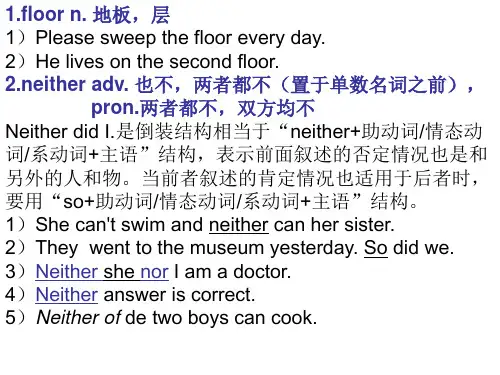
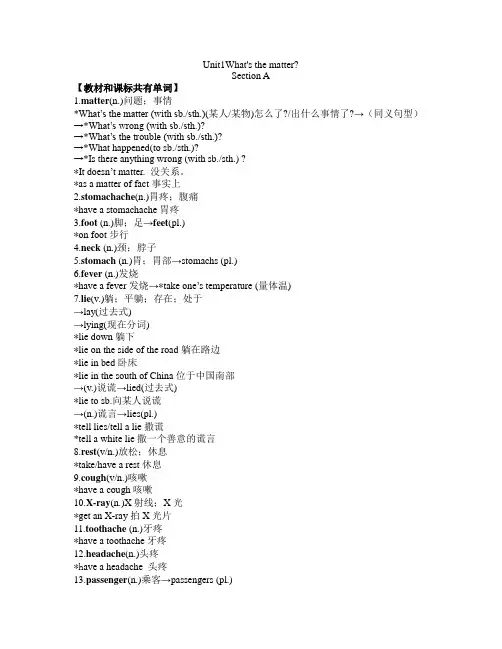
Unit1What's the matter?Section A【教材和课标共有单词】1.matter(n.)问题;事情*What’s the matter (with sb./sth.)(某人/某物)怎么了?/出什么事情了?→(同义句型)→*What’s wrong (with sb./sth.)?→*What’s the trouble (with sb./sth.)?→*What happened(to sb./sth.)?→*Is there anything wrong (with sb./sth.) ?*It doesn’t matter. 没关系。
*as a matter of fact事实上2.stomachache(n.)胃疼;腹痛*have a stomachache胃疼3.foot (n.)脚;足→feet(pl.)*on foot步行4.neck (n.)颈;脖子5.stomach (n.)胃;胃部→stomachs (pl.)6.fever (n.)发烧*have a fever发烧→*take one’s temperature (量体温)7.lie(v.)躺;平躺;存在;处于→lay(过去式)→lying(现在分词)*lie down躺下*lie on the side of the road躺在路边*lie in bed卧床*lie in the south of China位于中国南部→(v.)说谎→lied(过去式)*lie to sb.向某人说谎→(n.)谎言→lies(pl.)*tell lies/tell a lie撒谎*tell a white lie撒一个善意的谎言8.rest(v/n.)放松;休息*take/have a rest休息9.cough(v/n.)咳嗽*have a cough咳嗽10.X-ray(n.)X射线;X光*get an X-ray拍X光片11.toothache (n.)牙疼*have a toothache牙疼12.headache(n.)头疼*h ave a headache 头疼13.passenger(n.)乘客→passengers (pl.)*most passengers/most of the passengers大部分乘客*all the passengers/all of the passengers全部乘客14.off (adv./prep.) 离开(某处);不工作;从......去掉→(有关off短语)*get off下车*cut off切除;切断;阻隔*give off散发;放出(气味、光、热等)*put off推迟*set off出发;启程*show off炫耀*turn off关闭*take off脱掉;起飞15.*to one’s surprise使......惊讶的是;出乎......的意料→(n.)惊奇;惊讶(v.)使惊奇;使诧异surprise(n./v.)→(adj.)令人吃惊的surprising(修饰物)→(adj.)感到吃惊的surprised(修饰人)*get a surprise吃一惊*to one’s surprise令人吃惊的是*give sb. a (big) surprise给某人一个(大)惊喜*have a surprise party举行一场惊喜派对*surprise sb.使某人诧异*in surprise吃惊地*be surprised to do sth.做某事感到惊讶*be surprised at sth.对某物感到惊讶16.trouble(n.)问题;苦恼*in trouble在困境中*have trouble with sth.在某事上有困难*have trouble (in) doing sth.在做某事上有困难17.hit (v.)(用手或器具)击;打(n.)红极一时的人或事物→hit(过去式)→hitting(现在分词)*get/be hit by a ball被球击中*get hit on the head头部受到撞击*hit an old man撞到一位老人18.*right away立即;马上→at once (同义短语)→right now (同义短语)→in a minute (同义短语)19.*get into陷入;参与→*get into trouble(惹麻烦)*get into a car/a taxi(进入小汽车/出租车)20.herself (pron.)(she的反身代词)她自己【教材独有单词】21.sore (adj.) 疼痛的;酸疼的22.throat (n.) 咽喉;喉咙*have a sore throat喉咙疼23.onto (prep.) 朝;向*move the man onto the bus把这个人抬上公交车Unit1What's the matter?Section B【教材和课标共有单词】24.sick (adj.)生病的;有病的→ill (adj.近义词)→sickness/illness(n.) 疾病*fall/be/get sick/ill生病*a sick kid一个生病的孩子25.knee (n.)膝;膝盖26.ourselves (pron.)(we的反身代词)我们自己*help ourselves to sth.(我们)随便享用某物*enjoy ourselves(我们)玩的开心27.*get/be used to (doing) sth.习惯于(做)某事;适应于(做)某事→*used to (do sth.)过去常常(做某事);曾经(做某事)28.risk (n./v.) 危险;风险;冒险*take a risk/risks冒险*risk one’s life(to do sth.)冒着生命危险(去做某事)29.situation(n.)情况;状况*be in a difficult situation处于困境之中*be in a dangerous situation处于险境之中30.kilo(n.)千克;公斤→kilos(复数)*5 kilos of tomatoes五千克西红柿*a 360-kilo rock一块360公斤的石头31.rock (n.)岩石;摇滚乐→rocky(adj.)多岩石的;岩石的*rock climbing攀岩32.*run out用尽;耗尽=*use up(同义短语)→*sb.run out of sth.某人用光某物→*sth.run out某物被用光33.knife(n.)刀→knives(pl.)34.blood (n.)血*lose too much blood失去太多血35.mean (v.)意思是;意欲;打算→meant (过去式)→meaning (n.意思;意义)→meaningful (adj.有意义的)→meaningless (adj.无意义的)*mean to do sth.打算做某事*mean doing sth.意味着做某事*the meaning of life生活的意义;人生的意义*What’s the meaning of...?......的意思/意义是什么?=*What does...mean?36.decision (n.)决定;抉择*make a (good) decision做一个(好的)决定*make a decision to do sth.决定做某事*make one’s own decision自己做决定→decide (v.)决定*decide (not) to do sth.决定(不)做某事*decide on sth.决定某事37.control (n./v.) 限制;约束;管理*be in control of 掌管;管理36.spirit (n.)勇气;意志*be in good/high spirits兴高采烈38.*give up放弃→give up (doing) sth.放弃(做)某事→give it/them up放弃它/它们39.nurse (n.)护士【教材独有单词】40.bandage(n./v.) 绷带;用绷带包扎*bandage oneself给自己绑上绷带*put a bandage on the cut用绷带包扎伤口41.press (v.) 压;挤;按*press the sides of your nose压你的鼻子的两侧42.nosebleed (n.)鼻出血*have a nosebleed流鼻血43.breathe (v.)呼吸→breath (n.)呼吸*take a breath呼吸*have problems/trouble/difficulty breathing呼吸困难*out of breath上气不接下气44.sunburned (adj.)晒伤的*get sunburned晒伤45.climber(n.)登山者;攀登者→climb (v.)攀登;爬*mountain climbing登山运动*as a mountain climber作为一名登山者46.accident (n.)(交通)事故;意外遭遇*have an accident经历一场事故47.importance(n.)重要性→important (adj.)重要的*the importance of (doing) sth.(做)......的重要性*be of (great) importance(非常)重要48.death(n.)死;死亡→die (v.)死亡;消失;灭亡→dead (adj.)死的;无生命的→dying (adj.)奄奄一息的*die of死于(内因,如饥饿,年老,疾病)*die from死于(外因,如事故,刀伤,污染)*die out灭绝*die down逐渐变弱;逐渐消失。
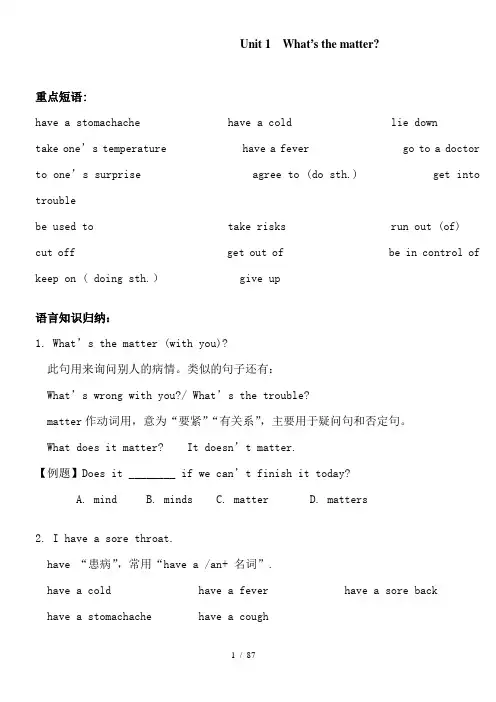
Unit 1 What’s the matter?重点短语:have a stomachache have a cold lie downtake one’s temperature have a fever go to a doctor to one’s surprise agree to (do sth.) get into troublebe used to take risks run out (of)cut off get out of be in control of keep on ( doing sth.) give up语言知识归纳:1. What’s the matter (with you)?此句用来询问别人的病情。
类似的句子还有:What’s wrong with you?/ What’s the trouble?matter作动词用,意为“要紧”“有关系”,主要用于疑问句和否定句。
What does it matter? It doesn’t matter.【例题】Does it ________ if we can’t finish it today?A. mindB. mindsC. matterD. matters2. I have a sore throat.have “患病”,常用“have a /an+ 名词”.have a cold have a fever have a sore back have a stomachache have a cough【例题】( )---Does he often have ______ cold? ---Yes. He also _____a cough and a sore throat.A. a; hasB. /; hasC. a; haveD. /; have3.Lie down and rest! 躺下休息lie down 躺下4.That’s probably why. 那可能就是原因。
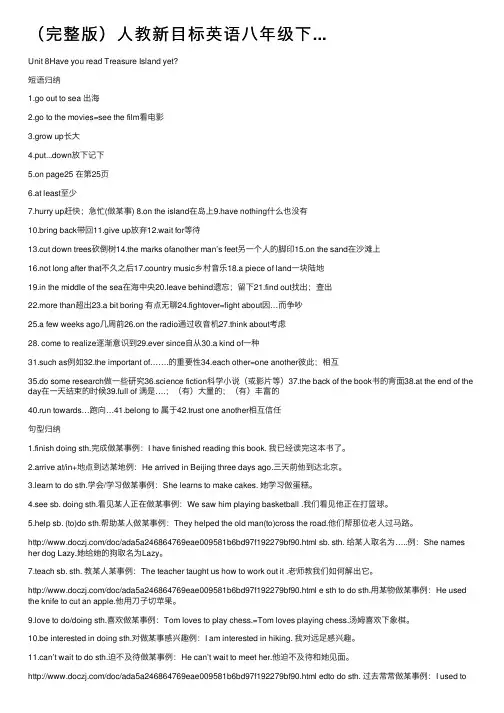
(完整版)⼈教新⽬标英语⼋年级下...Unit 8Have you read Treasure Island yet?短语归纳1.go out to sea 出海2.go to the movies=see the film看电影3.grow up长⼤4.put...down放下记下5.on page25 在第25页6.at least⾄少7.hurry up赶快;急忙(做某事) 8.on the island在岛上9.have nothing什么也没有10.bring back带回11.give up放弃12.wait for等待13.cut down trees砍倒树14.the marks ofanother man’s feet另⼀个⼈的脚印15.on the sand在沙滩上16.not long after that不久之后17.country music乡村⾳乐18.a piece of land⼀块陆地19.in the middle of the sea在海中央20.leave behind遗忘;留下21.find out找出;查出22.more than超出23.a bit boring 有点⽆聊24.fightover=fight about因…⽽争吵25.a few weeks ago⼏周前26.on the radio通过收⾳机27.think about考虑28. come to realize逐渐意识到29.ever since⾃从30.a kind of⼀种31.such as例如32.the important of…….的重要性34.each other=one another彼此;相互35.do some research做⼀些研究36.science fiction科学⼩说(或影⽚等)37.the back of the book书的背⾯38.at the end of the day在⼀天结束的时候39.full of 满是….;(有)⼤量的;(有)丰富的40.run towards…跑向…41.belong to 属于42.trust one another相互信任句型归纳1.finish doing sth.完成做某事例:I have finished reading this book. 我已经读完这本书了。
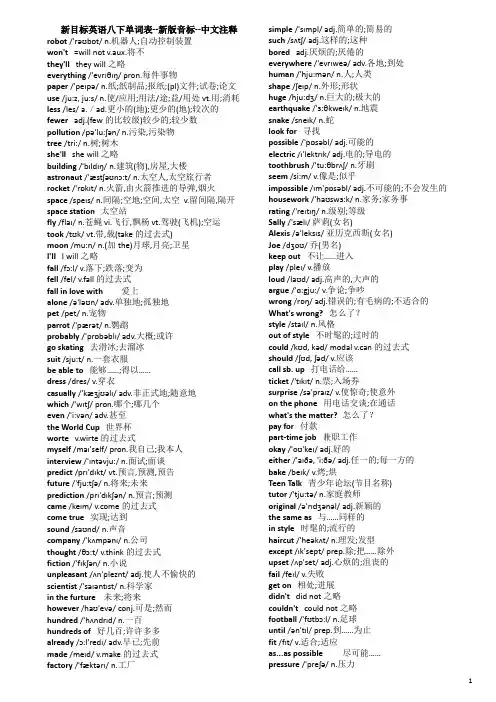
新目标英语八下单词表--新版音标--中文注释robot /'rəʊbɒt/ n.机器人;自动控制装置won't =will not v.aux.将不they'll they will之略everything /'evrɪθɪŋ/ pron.每件事物paper /'peɪpə/ n.纸;纸制品;报纸;(pl)文件;试卷;论文use /ju:z, ju:s/ n.使/应用;用法/途;益/用处 vt.用;消耗less /les/ a./ad.更小的(地);更少的(地);较次的fewer adj.(few的比较级)较少的;较少数pollution /pə'lu:ʃən/ n.污染,污染物tree /tri:/ n.树;树木she'll she will之略building /'bɪldɪŋ/ n.建筑(物),房屋,大楼astronaut /'æstʃəʊnɔ:t/ n.太空人,太空旅行者rocket /'rɒkɪt/ n.火箭,由火箭推进的导弹,烟火space /speɪs/ n.间隔;空地;空间,太空 v.留间隔,隔开space station 太空站fly /flaɪ/ n.苍蝇 vi.飞行,飘杨 vt.驾驶(飞机);空运took /tʊk/ vt.带,载(take的过去式)moon /mu:n/ n.(加the)月球,月亮;卫星I'll I will之略fall /fɔ:l/ v.落下;跌落;变为fell /fel/ v.fall的过去式fall in love with 爱上alone /ə'ləʊn/ adv.单独地;孤独地pet /pet/ n.宠物parrot /'pærət/ n.鹦鹉probably /'prɒbəblɪ/ adv.大概;或许go skating 去滑冰;去溜冰suit /sju:t/ n.一套衣服be able to 能够……;得以……dress /dres/ v.穿衣casually /'kæʒjʊəlɪ/ adv.非正式地;随意地which /'wɪtʃ/ pron.哪个;哪几个even /'i:vən/ adv.甚至the World Cup 世界杯worte v.wirte的过去式myself /maɪ'self/ pron.我自己;我本人interview /'ɪntəvju:/ n.面试;面谈predict /prɪ'dɪkt/ vt.预言,预测,预告future /'fju:tʃə/ n.将来;未来prediction /prɪ'dɪkʃən/ n.预言;预测came /keɪm/ e的过去式come true 实现;达到sound /saʊnd/ n.声音company /'kʌmpənɪ/ n.公司thought /θɔ:t/ v.think的过去式fiction /'fɪkʃən/ n.小说unpleasant /ʌn'pleznt/ adj.使人不愉快的scientist /'saɪəntɪst/ n.科学家in the furture 未来;将来however /haʊ'evə/ conj.可是;然而hundred /'hʌndrɪd/ n.一百hundreds of 好几百;许许多多already /ɔ:l'redɪ/ adv.早已;先前made /meɪd/ v.make的过去式factory /'fæktərɪ/ n.工厂simple /'sɪmpl/ adj.简单的;简易的such /sʌtʃ/ adj.这样的;这种bored adj.厌烦的;厌倦的everywhere /'evrɪweə/ adv.各地;到处human /'hju:mən/ n.人;人类shape /ʃeɪp/ n.外形;形状huge /hju:dʒ/ n.巨大的;极大的earthquake /'ɜ:θkweɪk/ n.地震snake /sneɪk/ n.蛇look for 寻找possible /'pɒsəbl/ adj.可能的electric /ɪ'lektrɪk/ adj.电的;导电的toothbrush /'tu:θbrʌʃ/ n.牙刷seem /si:m/ v.像是;似乎impossible /ɪm'pɒsəbl/ adj.不可能的;不会发生的housework /'haʊswɜ:k/ n.家务;家务事rating /'reɪtɪŋ/ n.级别;等级Sally /'sælɪ/ 萨莉(女名)Alexis /ə'leksɪs/ 亚历克西斯(女名)Joe /dʒoʊ/ 乔(男名)keep out 不让……进入play /pleɪ/ v.播放loud /laʊd/ adj.高声的,大声的argue /'ɑ:gju:/ v.争论;争吵wrong /rɒŋ/ adj.错误的;有毛病的;不适合的What's wrong? 怎么了?style /staɪl/ n.风格out of style 不时髦的;过时的could /kʊd, kəd/ modal v.can的过去式should /ʃʊd, ʃəd/ v.应该call sb. up 打电话给……ticket /'tɪkɪt/ n.票;入场券surprise /sə'praɪz/ v.使惊奇;使意外on the phone 用电话交谈;在通话what's the matter? 怎么了?pay for 付款part-time job 兼职工作okay /'oʊ'keɪ/ adj.好的either /'aɪðə, 'i:ðə/ adj.任一的;每一方的bake /beɪk/ v.烤;烘Teen Talk 青少年论坛(节目名称)tutor /'tju:tə/ n.家庭教师original /ə'rɪdʒənəl/ adj.新颖的the same as 与……同样的in style 时髦的;流行的haircut /'heəkʌt/ n.理发;发型except /ɪk'sept/ prep.除;把……除外upset /ʌp'set/ adj.心烦的;沮丧的fail /feɪl/ v.失败get on 相处;进展didn't did not之略couldn't could not之略football /'fʊtbɔ:l/ n.足球until /ən'tɪl/ prep.到……为止fit /fɪt/ v.适合;适应as...as possible 尽可能……pressure /'preʃə/ n.压力complain /kəm'pleɪn/ v.抱怨include /ɪn'klu:d/ v.包括;包含pushy /'pʊʃɪ/ adj.固执己见的;一意孤行的send /send/ v.发送;寄all kinds of 各种;许多compare /kəm'peə/ v.比较crazy /'kreɪzɪ/ adj.疯狂的;狂热的themselves /ðɛm'selvz/ pron.他(她、它)们自己adult /'ædʌlt/ n.成年人on the one hand (在)一方面organized adj.有组织的on the other hand (在)另一方面freedom /'fri:dəm/ n.自由Eve /i:v/ 伊夫(女名)Anna /'ænə/ 安娜(女名)Dennis /'denɪs/ 丹尼斯(男名)Maria /mə'raeə, -'rɪə/ 玛丽亚(女名)Julia 朱莉娅(女名)Erin /'erɪn/ 埃尔伦(女名)Nicole /nɪ'kɒl/ 尼科尔(女名)Emilio 艾米利奥(男名)Alice Green 艾丽丝.格林Cathy Taylor 卡西.泰勒Linda Miller 琳达.米勒UFO 不明飞行物;飞碟barger 理发师barber shop 理发店bathroom /'bɑ:θrʊm/ n.浴室;盥洗室bedroom /'bedrʊm/ n.寝室;卧室kitchen /'kɪtʃɪn/ n.厨房get out 出去;离开cut /kʌt/ v.剪;切;割alien /'eɪljən/ n.外星人bought /bɔ:t/ v. buy的过去式land /lænd/ v.着陆got /gɒt/ v.get的过去式shirt /ʃɜ:t/ n.衬衫;衬衣take off 起飞while /waɪl/ conj.当……的时候experience /ɪks'pɪərɪəns/ n.经历;体验around /ə'raʊnd/ adv.大约strange /streɪndʒ/ adj.奇怪的;陌生的follow /'fɒləʊ/ v.跟随;追随amazing /ə'meɪzɪŋ/ adj.令人惊异的kid /kɪd/ v.开玩笑;戏弄;欺骗scared adj.恐惧的climb /klaɪm/ v.攀登;爬jump /dʒʌmp/ v.跳跃shout /ʃaʊt/ v.呼喊;呼叫rode /rɒd/ v.ride的过去式cat /kæt/ n.猫train station 火车站ran /ræn/ v.run的过去式run away 逃跑;跑掉anywhere /'enɪweə/ adv.任何地方met /met/ v.meet的过去式come in 进来happen /'hæpən/ v.发生accident /'æksɪdənt/ n.事故Beijing International Airport 北京国际机场plane /pleɪn/ n.飞机heard /hɜ:d/ v.hear的过去式modern /'mɒdən/ adj.现代的;现代化的kill /kɪl/ v.杀死;致死Memphis /'memfɪs/ 孟菲斯(美国城市) murder /'mɜ:də/ v.&n.谋杀;凶杀hear about 听说bright /braɪt/ adj.明亮的;发亮的playground /'pleɪgraʊnd/ n.运动场;操场bell /bel/ n.钟;铃;门铃rang /ræŋ/ v.ring的过去式told /təʊld/ v.tell的过去式close /kləʊz, kləʊs/ v.关闭silence /'saɪləns/ n.寂静;沉默take place 发生recent /'ri:snt/ adj.最近的;近来的World Trade Center 世界贸易中心destroy /dɪs'trɒɪ/ v.破坏terrorist /'terərɪst/ n.恐怖分子meaning /'mi:nɪŋ/ n.意思;含义as...as... 像……(一样)became /bɪ'keɪm/ v.become的过去式flight /flaɪt/ n.航班;班机earth /ɜ:θ/ n.地球hero /'hɪərəʊ/ n.英雄flew /flu:/ v.fly的过去式tragedy /'trædʒɪdɪ/ n.悲剧Ted /ted/ 特德(男名)Davy /'deɪvɪ/ 戴维(男名)Martin Luther King 马丁.路德.金Robert Allen 罗伯特.艾伦ever /'evə/ adv.曾经;永远mad /mæd/ adj.疯狂的;狂热的anymore adv.再;还;今后snack /snæk/ n.小吃direct speect 直接引语reported speech 间接引语first of all 首先message /'mesɪdʒ/ n.消息;信息pass on 传递suppose /sə'pəʊz/ v.假定;认为;期望be supposed to 被期望或被要求……hard-working adj.勤勉的;努力工作的do well in 在……方面做得好grandpa /'grænpɑ:/ n.爷爷;外祖父in good health 身体健康report card 成绩单nervous /'nɜ:vəs/ adj.神经紧张的;不安的envelope /'envələʊp/ n.信封luckily /'lʌkɪlɪ/ adv.幸运地semester /sə'mestə/ n.学期worst /wɜ:st/ adj.bad的最高级true /tru:/ adj.真实的disappointing /'dɪsə'pɒɪntɪŋ/ adj.使人失望的lucky /'lʌkɪ/ adj.幸运的copy /'kɒpɪ/ v.复制;抄袭hers /hɜ:z/ pron.她的own /əʊn/ adj.自己的get over 克服;恢复;原谅village /'vɪlɪdʒ/ n.乡村Peking University 北京大学graduate /'grædjʊeɪt/ n.毕业生volunteer /'vɒlən'tɪə/ n.志愿者the Ministry of Education 教育部Chinese Young Pioneer 中国少年先锋队rural /'rʊərəl/ adj.乡下的;乡村的area /'eərɪə/ n.地区;地域meter /'mi:tə/ n.米;公尺sea level 海平面thin /θɪn/ adj.稀薄的ate /et/ v.eat的过去式fortunately /'fɔ:tʃənɪtlɪ/ adv.幸运地decision /dɪ'sɪʒən/ n.决定;决心husband /'hʌzbənd/ n.丈夫dormitory /'dɔ:mɪtrɪ/ n.宿舍senior high school 高中open up 打开start /stɑ:t/ n.开始;开端influence /'ɪnflʊəns/ n.影响hometown /hoʊm'taʊn/ n.家乡;故乡Greenpeace 绿色和平组织care for 照料;照顾border /'bɔ:də/ n.边界;边境UNICEF /'ju:nɪsef/ abbr.联合国儿童基金会WWF abbr.世界野生动物基金会danger /'deɪndʒə/ n.危险Lana /'lænə, 'lɑ:nə/ 拉娜(女名)Marcia /'mɑ:ʃə/ 马西娅(女名)Ben /ben/ 本(男名)Scott 斯科特(男名)Alan /'ælən/ 艾伦(男名)jeans n.牛仔裤organize /'ɔ:gənaɪz/ v.组织take away 拿走clean-up n.清除;打扫flower /'flaʊə/ n.花agent /'eɪdʒənt/ n.代理人;代理商around the world 在世界各地make a living 谋生against /ə'geɪnst, ə'genst/ prep.反对charity /'tʃærɪtɪ/ n.慈善团体;慈善事业chance /tʃɑ:ns/ n.机会;机遇all the time 一直injured adj.受伤的;受损害的sincerely /sɪn'sɪəlɪ/ adv.真诚的lawyer /'lɔ:jə/ n.律师tonight /tə'naɪt/ n.今晚;今夜mobile phone 移动电话What's the problem? 怎么了?fat /fæt/ adj.胖的;肥的window /'wɪndəʊ/ n.窗户play football 踢足球consequence /'kɒnsɪkwəns/ n.结果explain /ɪks'pleɪn/ v.解释;说明following /'fɒləʊɪŋ/ adj.下列的;下述的in order to 为了……improve /ɪm'pru:v/ v.提高;改进Harry /'hærɪ/ 哈里(男名)collect /kə'lekt/ v.收集;搜集shell /ʃel/ n.贝壳;壳marathon /'mærəθən/ n.马拉松赛跑skate /skeɪt/ v.滑冰pair /peə/ n.一对;一双skate /skeɪt/ n.溜冰鞋since /sɪns/ prep.自从;自……以来raise /'reɪz/ v.筹集several /'sevrəl/ adj.几个的;数个的skater /'skeɪtə/ n.溜冰者stamp /stæmp/ n.邮票kite /kaɪt/ n.风筝monster /'mɒnstə/ n.怪物;妖怪globe /gləʊb/ n.球状物;球体anyone /'enɪwʌn/ pron.任何人run out of 用完;用尽store /stɔ:/ v.储存cake /keɪk/ n.蛋糕;糕particularly /pə'tɪkjʊləlɪ/ adv.特别;尤其collector /kə'lektə/ n.收藏家by the way 顺便;附带说说common /'kɒmən/ adj.共同的;公共的extra /'ekstrə/ adj.额外的coin /kɒɪn/ n.钱币;硬币topic /'tɒpɪk/ n.话题;主题been /bi:n, bɪn/ v.be的过去分词be interested in 对……感兴趣writer /'raɪtə/ n.作家;作者capital /'kæpɪtl/ n.省会;首都European /'jʊərə'pi:ən/ adj.欧洲的;欧洲人的Russian /'rʌʃən/ adj.俄罗斯的;俄罗斯人的Australian /ɒs'treɪljən/ adj.澳大利亚的;澳大利亚人的n.澳大利亚人Jewish /'dʒʊ(:)ɪʃ/ adj.犹太人的;犹太族的Jew /dʒu:/ n.犹太人more than 比……多thousand /'θaʊzənd/ n.一千emperor /'empərə/ n.皇帝foreigner /'fɒrɪnə/ n.外国人quite /kwaɪt/ adv.相当;十分certain /'sɜ:tən/ adj.确实的;无疑的the Olympic Games 奥林匹克运动会far away 在远处miss /mɪs/ v.思念;想念mind /maɪnd/ v.介意not at all 一点也不turn down 调节使音量变小yard /jɑ:d/ n.院子right away 立刻;马上dish /dɪʃ/ n.盘;碟task /tɑ:sk/ n.任务;工作poster /'pəʊstə/ n.海报waitress /'weɪtrɪs/ n.女服务生brought /brɔ:t/ v.bring的过去式clothing /'kləʊðɪŋ/ n.衣服solution /sə'lju:ʃən/ n.解答;解决办法line /laɪn/ n.排;队;列wait in line 排队等候annoy /ə'nɒɪ/ v.使恼怒;使生气polite /pə'laɪt/ adj.有礼貌的;客气的perhaps /pə'hæps/ adv.或许;大概door /dɔ:/ n.门return /rɪ'tɜ:n/ v.归还;返回cut in line 插队hasn't /'hæznt/ has not之略keep...down 压低声音;使缓和voice /vɒɪs/ n.声音term /tɜ:m/ n.术语etiquette /'etɪ'ket, 'etɪket/ n.礼节normal /'nɔ:məlɪ/ adj.正常的;正规的behavior /bɪ'heɪvjə/ n.行为;举止;表现at first 首先Asian /'eɪʃən/ adj.亚洲的;亚洲人的Europe /'jʊərəp/ 欧洲uncomfortable /ʌn'kʌmfətəbl/ adj.不舒服的impolite /ɪmpə'laɪt/ adj.无礼的;粗鲁的allow /ə'laʊ/ v.允许;承认public /'pʌblɪk/ n.公众take care 当心;小心cough /kɒf/ v.咳嗽sneeze /sni:z/ v.打喷嚏break the rule 违反规则politely /pə'laɪtlɪ/ adv.客气地;斯文地smoke /sməʊk/ v.抽烟;吸烟put out 熄灭cigarette n.香烟;卷烟;纸烟criticize /'krɪtɪsaɪz/ v.批判careful /'keəfʊl/ adj.小心;当心drop /drɒp/ v.扔;丢litter /'lɪtə/ n.垃圾pick...up 捡起behave /bɪ'heɪv/ v.举止;表现suggestion /sə'dʒestʃən/ n.建议;提议comment /'kɒment/ n.评论;意见album /'ælbəm/ n.集子;相片薄;唱片集personal /'pɜ:sənl/ adj.私人的;个人的special /'speʃəl/ adj.特别的;特殊的;专门的receive /rɪ'si:v/ v.收到;接受gave /geɪv/ v.give的过去式guy /gaɪ/ n.家伙;人spider /'spaɪdə/ n.蜘蛛mouse /maʊs/ n.老鼠hamster /'hæmstə/ n.仓鼠turtle /'tɜ:tl/ n.海龟child /tʃaɪld/ n.孩子;儿女pot-bellied adj.大腹便便的;大肚子的pig /pɪg/ n.猪advantage /əd'vɑ:ntɪdʒ/ n.有利条件;优点disadvantage /'dɪsəd'vɑ:ntɪdʒ/ n.不利条件;缺点trendy /'trendɪ/ adj.流行的perfect /'pɜ:fɪkt, 'pɜ:fekt/ adj.完美的;理想的rabbit /'ræbɪt/ n.兔;野兔clean /kli:n/ adj.清洁的;干净的company /'kʌmpənɪ/ n.伙伴cost /kɒst/ v.价值(若干);花(多少钱)asleep /ə'sli:p/ adj.睡着的fall asleep 入睡choose /tʃu:z/ v.选择present /'preznt/ n.礼物open /'əʊpən/ v.打开later adv.稍后;随后given /'gɪvn/ v.give的过去分词give away 赠送;分发bench /bentʃ/ n.长凳;长椅rather than 胜于Sweden /'swi:dn/ 瑞典instead /ɪn'sted/ adv.代替;而不是the Olympics the Olympic Games之略,奥林匹克运动会enter /'entə/ v.参加;进入nearly /'nɪəlɪ/ adv.几乎sang /sæŋ/ v.sing的过去式clearly /'klɪəlɪ/ adv.清楚地;明显地stage /steɪdʒ/ n.舞台native /'neɪtɪv/ adj.本地的;本国的winner /'wɪnə/ n.胜利者modest /'mɒdɪst/ adj.谦虚的;谦让的interested /'ɪntrɪstɪd/ adj.感兴趣的encourage /ɪn'kʌrɪdʒ/ v.鼓励spokesperson n.发言人;代言人progress /'prəʊgres, prə'gres/ n.进步;前进the Olympic Committee 奥委会hear of 听说suggest /sə'dʒest/ v.建议;提议take an interest in 对……感兴趣besides /bɪ'saɪdz/ prep.而且;除……之外make friends with 与……交友statement /'steɪtmənt/ n.声明;陈述mention /'menʃən/ v.提及;说起drive /draɪv/ v.开车;驾驶amusement /ə'mju:zmənt/ n.娱乐;消遣neither /'naɪðə, 'ni:ðə/ pron.(二者)都不have a great time 玩的愉快Disneyland /'dɪznɪlænd/ 迪斯尼乐园Mickey Mouse 米老鼠Donald Duck 唐老鸭character /'kærɪktə/ n.人物;角色seen /si:n/ v.see的过去分词theme /θi:m/ n.主题attraction /ə'treækʃən/ n.有吸引力的事物(或人) roller coaster 过山车cruise /kru:z/ n.巡游;巡航boat /bəʊt/ n.小船board /bɔ:d/ n.甲板on board 在船上route /ru:t/ n.路线end up 结束island /'aɪlənd/ n.岛;岛屿especially /ɪs'peʃəlɪ/ adv.特别;尤其exchange student 交换生attendant /ə'tendənt/ n.出席者;参加者discover /dɪs'kʌvə/ v.发觉;发现requirement /rɪ'kwaɪəmənt/ n.要求;必要条件guide /gaɪd/ n.导游foreign /'fɒrɪn/ adj.外国的;外来的film /fɪlm/ n.电影southeast /'saʊθ'i:st/ n.东南 adj.东南的wonderful /'wʌndəfʊl/ adj.极好的holiday /'hɒlədɪ/ n.假日;假期;节日quarter /'kwɔ:tə/ n.四分之一;一刻钟three quarters 四分之三population /'pɒpjʊ'leɪʃən/ n.人口fear /fɪə/ v.害怕;担心brave /breɪv/ adj.勇敢的;无畏的excellent /'eksələnt/ adj.卓越的;极好的Indian /'ɪndɪən/ adj.印度的;印度人的safari /sə'fɑ:rɪ/ n.旅行;狩猎远征Night Safari (新加坡)夜间野生动物园dark /dɑ:k/ n.黄昏;黑暗fox /fɒks/ n.狐狸natural /'nætʃərəl/ adj.自然的;自然界的environment /ɪn'vaɪərənmənt/ n.环境temperature /'tempərɪtʃə/ n.温度all year round 一年到头;终年equator /ɪ'kweɪtə/ n.赤道whenever /wen'evə/ conj.无论如何spring /sprɪŋ/ n.春天autumn /'ɔ:təm/ n.秋天season /'si:zn/ n.季节type /taɪp/ n.类型awake /ə'weɪk/ adj.醒着的Franklin Lake 弗兰克林湖noon /nu:n/ n.中午sandy /'sændɪ/ adj.含沙的;多沙的goodbye int.再见look through 浏览bookstore /'bʊkstɔ:/ n.书店cross /krɒs/ v.穿过;横过;越过elevator /'elɪveɪtə/ n.电梯low /ləʊ/ adj.低的slow /sləʊ/ adj.慢的;缓慢的fan /fæn/ n.迷;狂热者note /nəʊt/ n.短信;笔记come along 出现;发生get along 相处bady n.婴儿;小孩at least 至少traffic /'træfɪk/ n.交通least /li:st/ adj.little的最高级review /rɪ'vju:/ n.复习;回顾Erhu 二胡somewhere /'sʌmweə/ adv.某处;在某处。
Unit 2 I'll help clean the city parks.Section A1. 短语动词小结常见短语动词结构有下面几种:(1).动词+副词give up 放弃turn off 关掉stay up 熬夜这种结构有时相当于及物动词,如果其宾语是代词,就必须放在动词和副词之间,如果是名词,则既可插在动词和副词之间,也可放在短语动词后。
(2).动词+介词=及物动词,后跟宾语。
listen of 听look at 看belong to 属于(3).动词+副词+介词come up with 提出,想出run out of 用完,耗尽(4).动词+名词(介词) 如:take part in参加catch hold of 抓住2.helphelp sb. (to) do 帮助某人做某事help sb. with sth. 帮助某人做某事help do sth 帮助做某事help oneself to sth随便吃help sb. out 帮助某人解决难题(摆脱困境)clean up 打扫clean-up n. 打扫3. cheer cheer (sb.) up 使(某人)高兴、振作cheer me up 使我高兴(1) v 欢呼,喝彩(2) v 为...欢呼,高呼(3) n 可数欢呼声,喝彩声(4) cheer on 为...加油3.give out v+adv(1)散发,分发= hand out give out sth to sb. 分….给某人(2)发出(光热声音气味等)(3)用完耗尽Our food will give out soon.give away 赠送捐赠give away sth. to sbgive sb. sth. 给某人某东=give sth. to sb. 给某人某东西5. put off 推迟(后接名词、代词、动名词作宾语)put off doing 推迟做某事put away 收起来put on穿上put out扑灭;伸出put up张贴,搭建put back放回原处put down 放下记下6.notice可数名词:公告牌,通告,布告不可数名词:注意Take notice of what I say.动词:注意到留心看到ed to do sth过去…(现在不了) 没有人称和时态变化get/be used to doing习惯于(一直在做)be used to do被用来做be used for+n/ doing被用于…Stamps are used for sending mails.She goes to climb mountains every Sunday.But she used to hate climbing mountains.8.lonely alonelonely adj 孤单的(心理状态,内心感到孤独,侧重于缺少同伴或同情而感到孤独,感情色彩较强)作表语;也可作定语修饰地点名词,荒凉的,侧重于人迹罕至或远离人烟,很荒凉alone adj 单独的,独自的;adv 独自地侧重一个人与其他的人或事物分开,不含感情色彩He feels lonely without friends.He is alone in the room.独自呆在房间He lives alone but doesn’t feel lonely.9.volunteer(1)可数名词志愿者(2)adj. 自愿的(3) v volunteer to do sth 志愿效劳、主动贡献They are the Chinese People’s V olunteers. 他们是中国人民志愿军。
新目标人教版初中英语八年级下册课文复习全套资料Unit 1 Making a difference- Lesson 1 We need to protect animals- Lesson 2 I must ask him to give up smoking- Lesson 3 Ann’s decision- Lesson 4 Making a differenceUnit 2 It’s a mystery- Lesson 1 Everything is made of atoms- Lesson 2 What’s the matter?- Lesson 3 Detective stories- Lesson 4 The mystery of the human brainUnit 3 Travel journal- Lesson 1 A trip to Australia- Lesson 2 Beijing is bigger than London- Lesson 3 A trip to Mount Tai- Lesson 4 A river tripUnit 4 Music- Lesson 1 Sounds of music- Lesson 2 We’re trying to find a boy band- Lesson 3 A famous orchestra- Lesson 4 Music in our heartsUnit 5 Amazing stories- Lesson 1 A greener future- Lesson 2 I used to be afraid of the dark- Lesson 3 Pygmalion- Lesson 4 Amazing sports storiesUnit 6 Films and TV programmes- Lesson 1 TV programmes- Lesson 2 What’s on?- Lesson 3 Jurassic Park- Lesson 4 Harry Potter and the Philosopher's StoneUnit 7 Teenagers should be allowed to choose their own clothes- Lesson 1 Children should be allowed to grow up freely- Lesson 2 Uniforms or casual clothes?- Lesson 3 Different styles- Lesson 4 Fashion and societyUnit 8 Helping others- Lesson 1 Offering help- Lesson 2 First aid- Lesson 3 Volunteers- Lesson 4 A charity show这份全套资料包含了新目标人教版初中英语八年级下册的每个单元以及它们各自包含的四节课。
新版新目标八年级下unit3Could you please clean your room? 知识点总结(情态动词表有礼貌的请求,征询许可,祈使句的用法)重点短语1.do the dishes=wash the dishes 洗碗碟2.take out the rubbish 把垃圾拿出去3.fold your clothes叠衣服4.sweep the floor清扫地板5.make your / the bed 铺床6.clean the living room打扫起居室7.No problem.没问题8.go out for dinner.出去吃饭9.stay out late = stay up 熬夜10.g et a ride 开车兜风give sb a ride 让某人搭便车11.h elp out with 给予什么帮助12.b e back = come back 回来13.c ome over to sp 顺便拜访某地;drop in on sb顺便拜访某人14.a sk in surprise惊奇地问=be surprised to ask15.n either of 两者中没有一个(作主语谓语常用单数)--both of16.a s soon as 一……就……as soon as possible尽可能快17.g et something to drink/ eat弄些喝的东西18.h ang out with…同……一起闲逛(hang 过去式hung)19.C ould you please do…? (礼貌请求)你可以做……吗?20.C ould I please do…? (征求意见)我可以做……吗?21.c lean the living room打扫起居室22.d o some washing/ shopping/ cleaning洗衣服/ 购物/ 做清洁23.s tay out late/ until nine呆到很晚/ 呆到9点钟=stay up 熬夜24.g ive me a ride to town开车送我到镇上25.n eed to do something需要做……26.d o one’s part in doing sth尽自己的职责做某事play a part in doing sth 参与干某事do one’s best to do sth尽自己最大努力干某事27.h elp out with a few things帮助做些事情28.a t least 至少29.f inish doing something完成做……30.b e/ come back from shopping购物回来31.a ny minute/ second/ moment now随时;立刻,马上32.i nvite sb sp 邀请某人去某地invite sb to do sth =sb be invitedto do sth邀请某人干什么invite(名词)invitationThanks for inviting me.= Thanks for your invitation.33.b e angry with sb对某人生气be angry at st h因某事而生气34.s olve the problem解决问题35.t hrow down my bag扔下我的书包36.t he minute/ as soon as / the moment I sat down我一坐下就37.t ake the dog for a walk= walk dog溜狗38.r eplied angrily生气地回答39.a ll the time一直40.n ever help out around the house从没帮助做家务41.w ork all day工作一整天42.d o housework all evening整晚做家务43.s hout back吼回去44.f ind the house clean and tidy发现房间干净又整洁【find / make / feel + it +形容词+ to do sth】45.s hare the housework分担家务46.a clean and comfortable home一个干净又舒服的家47.n either of us我们两个都不48.p ass me the salt= pass the salt to me把盐递给我49.b orrow sth from sb= borrow sb sth.从某人那里借某物【borrow 的持续性动词为keep –过去分词kept】50.l end sth to sb= lend sb sth把某物借给某人51.h ate to do/doing something讨厌做……52.e nough stress from school来自于学校的足够的压力53.b e / get stressed out有压力;紧张54.a waste of their time时间的浪费55.s pend … on/ doing sth花时间在……上56.i n order (not)to do something为了做(不做)……57.g et into a good university进好大学58.t here is no need for sb to do something对于某人来说没必要做59.d epend on 依靠……(常接whether引导的宾语从句,不用if)60.d evelop children’s independence 养成孩子的独立(习惯)61.a developing country 一个发展中国家62.a developed country 一个发达国家63.t he idea of fairness公平意识64.f all ill(短暂性)生病=be ill (持续性)65.g rades dropped成绩下降66.a s a result结果;as a result of =because of 因为;由于67.i t’s fair/ unfair for children to do something对于孩子来说,做……是公平的/ 不公平的。
八年级英语下册单元知识点总结Unit 7 What’s the highest mountain in the world?一、重点单词和短语表达1.about 9,600,000 square kilometers in size ; 1025meters deep= 1025 meters in depthin size = have /has an area of...(面积)大小基数词+ 单位名词+ 形容词(long,wide,tall, deep等)=基数词+ 单位名词+ in + 名词(length; width; height; depth等)数字+ 量词(单位)+形容词(long/ wide/ tall/ deep等); 长、宽、高、深还可用复合形容词表示各个词间用连字符连接,常作前置定语修饰名词。
Adj--- N : wide---width deep---depth long---length high---heighttwo meters long = two meters in length 2米长three feet high = two feet in height. 3英尺高Jeremy is a 1.91-meter-tall- basketball player.2.geography n地理---adj: geographical3.higher than any other mountain 比其他任何一座山高any other 其他任何一个,后接可数名词单数,在同一范围内除了某人或某物以外的其他任何人或物通常用于比较级,多用于同一范围内相比较。
any other +可数名词单数=the other + 可数名词复,也可用最高级形式表达。
Lucy is more careful than any other student in her class. (any other + 可数名词单数)=Lucy is more careful than the other students in her class. (the other + 名词复数)= Lucy is the most careful student in her class.4.the population of China中国的人口one of the oldest countries 最古老的国家之一(1) population做主语且强度整体人口时,谓语动词一般用单数,The population is increasing faster and faster.(2) 当主语时“人口的百分之几、几分之几”时,谓语动词常用复数形式。
新新目标八年级英语(下)语法填空Unit1Bus Driver and Passengers Save an Old ManAt 9:00 a.m. yesterday, bus No. 26 1 (go) along Zhonghua Road when the driver saw an old man 2 (lie) on the side of the road. A woman next to him 3 (shout) for help. The bus driver, 24-year-old Wang Ping, stopped the bus without 4 (think) twice. He got off and asked the woman what happened. She said that the man had a heart problem and 5 (go) to the hospital. Mr. Wang knew he had to act 6 (quick). He told the passengers that he 7 (take) the man 8 the hospital. He expected most or all of the passengers 9 (get) off and wait for the next bus. But to his 10 (surprised), they all agreed 11 (go) with him. Some passengers helped Mr. Wang to move the man on the bus. Thanks 12 Mr. Wang and the passengers, the doctors saved the man in time. "It's sad that many people don't want 13 (help) others because they don’t want any trouble," says one passenger. "But the driver didn't think about 14 (he). He only thought about 15 (save) a life."He Lost His Arm But Is Still Climbing Aron Ralston is an American man 1is interested in mountain climbing. 2 amountain climber, Aron is used 3 (take) risks. This is one of the exciting things about doing 4 (danger) sports. There 5(be) many times when Aron almost lost his life because 6 accidents. 7 April 26, 2003, he found 8 (he) in a very dangerous situation when climbing in Utah On that day, Aron's arm 9 (caught) under a 2,000-kilo rockthat fell on him when he was climbing by himself in the mountains. Because he 10 (not free) his arm, he stayed there for five days and hoped that someone 1 (find) him. But when his water ran out, he knew that he would have to do something 2 (save) his own life. He was not ready 3 (die) that day. So he used his knife 4 (cut) off half his right arm. Then, with his left arm, he bandaged himself so that he would not lose too 5 (many) blood. After that, he climbed down the mountain to find help.After 6 (lose) his arm, he wrote a book called Between a Rock and a Hard Place. This means being in a difficult situation that you cannot seem 7 (get) out of. In this book, Aron tells of the 8 (important) of making good decisions, and of being in control 9 one's life. His love for mountain climbing is so great that he kept on 10 (climb) mountains even after this experience.Do we have the same spirit as Aron? Let's think about it before we find ourselves “between a rock and a hard place”, and before we have to make a decision that could mean life or death.Unit2Students Who Volunteer Mario Green and Mary Brown from Riverside High School give up several hours each week to help others.Mario loves animals and wants 1 (be) an animal doctor. He volunteers at an animal hospital every Saturday morning. Mario believes it 2 (help) him 3 (get) his future dr eam job. “ It' s hard work , ” he says , “but I want to learn more about how 4 (care) for animals . I get such a strong feeling of satisfaction when I see the animals get better and the look of joy 5 their owners' faces.”Mary is a book lover. She could read by 6 (she) at the age of four. Last year she decided 7 (try) out for a volunteer after-school reading program . She still works there once a week 8 (help) kids learn to read. The kids are sitting in the library, but you can see in their eyes that they’re going on a different journey 9each new book. 10 (volunteer) here is a dream come true for me. I can do what I love to do and help others at the same time.I’ll Send You a Photo ofLuckyDear Miss Li,I’d like 1 (thank) you for 2 (send) money to Animal Helpers. I’m sure you know that this group 3 (set) up to help disabled people like me. You helped to make 4 possible for me to have Lucky. Lucky makes a big 5 (different) to my life. Let me 6 (tell) you my story.What would it be like to be blind or deaf? Or imagine you 7 (not walk) or use your hands 8 (easy). Most people would never think about this, but many people have these difficulties. I can’t use my arms or legs well, so normal things like answering the telephone, opening and closing doors, or carrying things are difficult for me. Then one day last year, a friend of mine helped me out. She talked to Animal Helpers about 9 (get) me a special trained dog. She also thought a dog might cheer me 10 . I love animals and I was excited about the idea of having a dog.After six months of 1 (train) with a dog at Animal Helpers, I was able 2(bring) him home. My dog’s name is Lucky — a good name for him because I feel very 3 (luck) to have him. You see, I’m only able to have a “dog-helper” because 4 your 5 (kind)! Lucky is very clever and understands many English words. He 6(understand) me when I give him orders. For example, I say, “Lucky!Get my book,” and he does it at once.Lucky is a fantastic dog. I’ll send you a photo of 7 (he) if you like, and I could show you how he helps me. Thank you again 8 changing my life.Best wishes,Ben SmithUnit3Dear Sir,I don’t understand why some parents make their kids help with housework and chores at home. Kids these days already have enough stress from school. They don’t have time 1 (study) and do housework, too. Housework is a waste 2 their time. Could we just let them 3 (do) their job as students? They should spend their time 4schoolwork in order 5 (get) good grades and get into a good university. Also, when they get 6 (old), they will have to do housework s o there’s no need for them to do it now. It is the 7 (parent) job to provide a clean and comfortable environment at home 8 their children. And anyway, I think 9(do) chores is not so difficult. I don’t mind 10 (do) them.Mr. SmithDear Sir,I think it is important 1 children to learn how 2 (do) chores and help their parents 3 housework. It’s not enough to just get good grades at school. Children these days depend 4 their parents too much. They’re always aski ng, “Could you get this for me?” or “Could you help me with that?” Doing chores 5 (help) to develop children’s independence and teaches them how to look after 6 (they). It also helps them to understand the idea of fairness. Since they live in one house with their parents, they 7 (know) that everyone should do their part in 8 (keep) it clean and tidy. Our neighbor’s son got into a good college but during his first year, he had no idea how to take care of himself. As a result, he often fell ill and his grades 9 (drop). The 10 (early) kids learn to be independent, the better it is for their future.Ms. MillerUnit4(P27 3a) Dear Mr. Hunt,My problem is I can’t get on 1 my family. Relations between my parents have become difficult. They fight a lot, and I really don’t like it. It’s the only 2(communicate) they have. I don’t know if I 3 (say) anything to them about this. When they argue, it’s like a big, black cloud 4 (hang)over our home. Also, my 5 (old) brother is not very nice to me. He always refuses 6 (let) me watch my favorite TV show. Instead he watches whatever he wants until late at night. I don’t think this is fair. At home I always feel lonely and nervous. Is that normal? What can I do?Sad and ThirteenDear Sad and Thirteen,It’s not easy 7 (be) your age, and it’s normal to have these feelings. Why 8 (not) you talk about these feelings with your family? If your parents are having problems, you should offer 9 (help). Maybe you could do more jobs around the house so that they have 10 (much) time for proper communication. Secondly, why don’t you sit down and communicate 11 your brother? You 12 (explain) that you don’t mind h im 13 (watch) TV all the time. However, he should let you 14 (watch) your favorite show. I hope you 15 (feel) better for you soon. Robert Hunt(P30 2b)Maybe You Should Learn to Relax!These days, Chinese children are sometimes 1 (busy) on weekends than weekdays because they have to take so 2 (much) after-school classes. Many of them 3 (be)learning exam skills so that they can get into a good high school and later a good university. Others are 4 (practice) sports so that they can compete and win. However, this doesn’t only happen in China. The Taylors 5 (be) a typical American family. Life for Cathy Taylor’s three children is very busy.” On most days after school,” Cathy says, “I take one of my two boys 6 basketball practice and my daughter to football training. Then I have to take my other son to piano lessons. Maybe I could cut 7 a few of their activities, but I believe these activities are important for my 8 (child) future. I really want them 9 (be) successful. ” However,the tired children don’t get home 10 after 7:00 p.m. They have a quick dinner, and then it’s time for homework.Linda Miller, a mother of three, 1 (know) all about such stress. “In so me families, competition starts very young and continues until the kids get older,” she says. “Mothers sendtheir small kids 2 all kinds of classes. And they are always comparing them 3other children. It’s crazy. I don’t think that’s fair. W hy don’t they just let their kids be kids? People shouldn’t push their kids so hard.”Doctors say too 4 (many) pressure is not good for a child’s 5 (develop). Dr. Alice Green says all these activities 6(cause) a lot of stress for c hildren. “Kids should have time 7 (relax) and think for 8 (they), too. Although it’s normal to want 9 (successfully) children, it’s even more important 10 (have) happy children.”Unit 5(P35 3a)The Storm Brought People Closer TogetherBen could hear strong winds outside his home in Alabama. Black clouds 1 (make) the sky very dark. 2 no light outside, it felt like midnight. The news on TV reported that a heavy rainstorm was in the area.Everyone in the neighborhood 3 (be) busy. Ben’s dad 4 (put) pieces of wood over the windows while his mom 5(make) sure the flashlights and radio were working. She also put some candles and matches on the table.Ben was helping his mom make dinner when the rain 6 (begin) to beat heavily 7the windows. After dinner, they tried 8 (play) a card game, but it was hard to have fun with a serious storm happening outside.Ben 9 (not sleep) at first. He finally fell asleep when the wind was dying down at around 3:00 a.m. When he woke up, the sun was rising. He went outside with his family and found the neighborhood in a mess. Fallen trees, broken windows and rubbish were everywhere.They joined the neighbors 10 (help) clean up the neighborhood together. Although the storm broke many things apart, it brought families and neighbors closer together.(P38 2b)Do You Remember What You Were Doing?People often remember what they 1(do) when they heard the news of important events in history. In America, for example, many people remember what they were doing 2 April 4, 1968. This was an important event in American history. On this day, Dr. Martin Luther King 3 (kill). Although some people may not remember who killed him, they remember what they were doing when they 4 (hear) the news.Robert Allen is now over 50, but he was a school pupil at that time. “I was at home with my parents,” Robert remembers. “We were eating dinner in the kitchen when we heard the news on the radio. The news reporter said, ‘Dr. King died just 10 minutes ago.’ My parents were completely 5 (shock). My parents did not talk after that, and we finished the rest of our dinner 6 silence. More recently, most Americans remember what they were doing when the World Trade Center in New York 7 (take) down by terrorists. Even the date-September 11, 2001-has meaning to most Americans.This was a day Kate Smith will never forget. She remembers 8 (work) in her office near the tw o towers. “My friend shouted that a plane just hit the World Trade Center! I didn’t believe him at first, but then I looked out the window and 9 (realize) that it was true. I was so 10 (scare) that I could hardly think clearly after that.”Unit6(P43 3a) In November 1979, pupils in England were able 1 (watch) a new TV program 2 (call) Monkey. Most of them were hearing this story for the first time. However, this story is not new to Chinese children. The Monkey King or Sun Wukong is the main character in the 3 (tradition) Chinese book Journey to the West.The Monkey King is not just any normal monkey. In fact, he sometimes does not even look 4 a monkey! This is because he can make 72 changes to his shape and size, 5 (turn) himself into different animals and objects. But unless he can hide his tail, he cannot turn himself into a person. 6 fight bad people, the Monkey King uses a magic stick. Sometimes he can make the stick so small 7 he can keep it in his ear. At other times, he is able to make it big and long.The Monkey king has excited the 8(child) of China many years. And as soon as the TV program came out more than 30 years ago, Western children became interested in 9 (read) this story because the clever Monkey King keeps 10 (fight) to help the weak and never gives up.Unit7(P51 3a) Qomolangma—the Most Dangerous Mountain in the World? One of the world’s 1 (dangerous) sports is mountain climbing, and one of the most popular places for this is the Himalayas. The Himalayas run along the southwestern part of China. Of all the mountains, Qomolangma rises the highest and is the most famous. It is 8,844.43 meters high and so is very dangerous 2 (climb). Thick clouds cover the top and snow can fall very hard. Even more serious difficulties 3 (include) freezing weather conditions and heavy storms. It is also very hard to take in air as you get near the top.The first people 4 (reach) the top were Tenzing Norgay and Edmund Hillary 5 May 29,1953. The first Chinese team did so in 1960, while the first woman to 6(success) was Junko Tabei from Japan in 1975. Why do so many 7 (climb) risk their lives? One of the mainreasons is because people want 8 (challenge) themselves in the face of difficulties.The spirit of these climbers shows us that we should never give up 9 (try) to achieve our dreams. It also shows that humans can sometimes be 10 (strong) than the forces of nature.(P54 2b) It is 8:30 a.m. at the Chengdu Research Base. Lin Wei and the other panda 1(keep) are preparing the milk 2 the baby pandas’ breakfast. At 9:00 a.m., they find that most of the babies are already 3(wake) and hungry. When the babies see the keepers, they run over with 4 (excite) and some of them even walk 5 their friends and fall over!“They’re so cute and lovely. I take care of 6 (they) like they’re my own babies. I was h, feed and play with them every day. They’re very special to me.” Lin Wei loves her job, but it is a difficult one.Pandas do not have many babies, maybe only one every two years. The babies often die from 7 (ill) and do not live very long. Adult pandas spend more than 12 hours a day 8 (eat) about 10 kilos of bamboo. Many years ago, there were a lot more bamboo forests and pandas in China, but then humans started to cut9 the forests. Scientists say there are now10 (few) than 2,000 pandas 11(live) in the remaining forests. Another 200 or solive in zoos or research centers in China and other 12 (country).An education program in Chengdu 13 (teach) children in cities about pandas and other endangered animals. They send people 14 schools to tell children about the importance of 15 (save) these animals. The 16 (child) sing songs or make artwork about pandas and other wild animals. 17 (teach) children is one way to help save pandas. The Chinese government is also 18 (plant) more bamboo trees so there will be more forests for pandas to live 19 . We all hope that in the future there 20 (be) a lot more pandas than now.Unit8(P59 3a) When I first arrived on this island, I had nothing. But I’ve found the ship and made a small boat. I’ve brought back many things I can use— food and drink, tools, knives and guns. Although I have lost everything, I have not lost my life. So I will not give up and I will wait for another ship. I have already cut down trees and built a house. I go out with my gun almost every day to kill animals and birds for food. I’m even learning to grow fruits and vegetables.A few weeks ago, I found the marks of another man’s feet on the sand. Who else is on my island? How long have they been here? Not long after that, I saw some cannibals trying to kill two menfrom a broken ship. One of them died but the other ran towards my house. I helped him kill the cannibals. This man now lives with me and helps me. I named him Friday because that was the day I met him. He is smart and I have already taught him some English.(P62 2b) A Country Music Song Changed Her Life ForeverWhen Sarah was a teenager, she used 1 (fight) over almost everything with her family. But five years ago, while she 2 (study) abroad in England, she heard a song full of feelings about 3 (return) home on the radio. It made Sarah 4 (think) about her family and friends back in the US. She came to realize how much she actually missed all of them. Ever since then, she 5 (be) a fan of American country music.Country is a 6 (tradition) kind of music from the 7 (south) states of America. Nashville, Tennessee is the home of country music. Many songs these days are just about modern life in the US, such as the importance of money and 8 (succeed), but not about belonging to a group. However, country music brings us back to the “good old days” when people were kind 9 each other and trusted one another. It reminds us that the best things in life are free—laughter, friends, family, and the 10 (beautiful) of nature and thecountryside.Sarah hasn’t been to Nashville yet, but it is her dream 11 (go) there one day. She has already read a lot about the place and done some research on it. She knows that there is a Country Music Hall of Fame Museum in Nashville. There are also always a lot of great country music concerts with famous 12 (music) and singers, like Garth Brooks. Sarah has already listened13 mostof his songs. “Garth is one of the 14 (successful) musicians in American history. He’s sold more than 120 15 (million) records. I hope 16 (see) him 17(sing) live one day!”Unit9(P67 3a)Ken:The most interesting museum I’ve ever beento 1 (be) the American Compute Museum. They have information about different computers and who invented them. The old computers were much 2 (big). It’s unbelievable that technology 3 (progress) in such a rapid way! I’ve also learned that there was a special computer. It could play chess even better than humans. I wonder how much more computers 4 (be) able to do in the future.Amy:I’ve recently been to a very unusual museum in India, the International Museum ofToilets. I just couldn’t believe my eyes when I saw so 5 (much) different kinds of toilets there. The museum teaches people about the history and 6 (develop) of toilets. It also encourages governments and social groups 7 (think) about ways 8(improve) toilets in the future.Linlin :Last year I 9 (go) to the Hangzhou National Tea Museum. It’s a 10 (relax) and peaceful place near a lake. The tea art 11 (perform) show how 12 (make) a perfect cup of tea. 13 (watch) the tea preparation is just as 14 (enjoy) as drinking the tea itself. I’ve finally 15 (realize) why my grandpa loves drinking tea and collecting tea sets.(P70 2b)Singapore-A Place You Will Never Forget!Have you ever been to Singapore? For 1 (thousand) of tourists from China, this small island in Southeast Asia is a wonderful and safe place 2 (take) a holiday. On the one hand, more than three quarters of the population 3 (be) Chinese, so you can simply speak Putonghua a lot of the time. On the other hand, Singapore is 4 English-speaking country, so it’s also a good place 5 (practice) your English!Have you ever tried Chinese food outside of China? Maybe you fear that you won’t be able 6(find) anything good to eat when you travel. In Singapore, however, you’ll find a lot of food from China; you won’t have any problem 7 (get) rice, noodles or dumplings. Singapore is also an excellent place to try new food. Whether you like Indian food, Western food or Japanese food, you’ll find it all in Singapore!Most large 8 (city) have zoos, but have you ever been to a zoo at night? Singapore has a Night Safari. It might seem strange to go to a zoo when it’s dark. However, if you go to see lions, tigers or foxes during the daytime, they’ll probably be asleep! A lot ofanimals only wake up at night , 9 this is the best time to watch them. At the Night Safari, you 10 (watch) these animals in a more natural environment than in a normal zoo.One great thing about Singapore is that the temperature is almost the same all year round. This is because the island is so close to the equator. so you can choose to go whenever you like-spring, summer, autumn or winter. And, of course, it’s not too far from China!Unit10(P75 3a) My children are growing up fast. My daughter is 16 and my boy has just started junior high school. As they get bigger our house seems 1 (get) smaller. So we want to sell some of our things in the yard sale and give the money 2 a children’s home.We have already 3 (clear) out a lot of things from our bedrooms. We have decided to each sell five things that we no longer use. My son was quite sad at first. Although he has not played with his old toys 4 a long time, he still wanted 5 (keep) them. For example, he’s owned a train and railway set since his 6 (four) birthday, and he played with it almost every week until he was about seven. And he did not want to lose the toy monkey, either. He 7 (sleep) next to the monkey every night when he was a child. My daughter was 8 (understand), although she also felt sad 9 (part) with certain toys.As for me, I did not want to give up my football shirts, but, to be honest, I have not played for a while now. I’m getting 10 (older), too!(P78 2b) Hometown Feelings Some people still live in their hometown. However, others may only see it once or twice a year. Nowadays, millions 1 Chinese leave the countryside 2 (search) for work in the cities. Among these is Zhong Wei, a 46-year-old husband and father. He 3 (live) in Wenzhou for the last 13 years. With a hard job in a crayon factory, he doesn’t find much time to visit hi s hometown. “I used 4(return) home at least once a year, but I haven’tbeen back for almost three years now. It’s a shame, but I just don’t have the time,” he says. Many people like Zhong Wei regard with great interest how their hometowns 5 (change). Perhaps large hospitals and new roads have appeared. In many places, the government has alsobuilt new schools and sent teachers from the cities to help.“I noticed that’s true of my hometown,” adds Zhong Wei. “Children have learned 6 (read) and count at my old primary school since the mid-20th century. But now the buildings are really old. I hear they’re going to build a new school there.” Zhong Wei thinks such developments are good, and he also knows that his hometown cannot always stay the same.According 7 Zhong Wei, however, some things will neverchange. “In my hometown, there was a big old tree opposite theschool. It is still there and has become quite a symbol of the place. Most of the children in my time liked 8 (play) together under that big tree, 9 (especial) during the summer holidays. It was such a happy childhood. Our hometown has left many soft and sweet 10 (memory) in our hearts.”21。